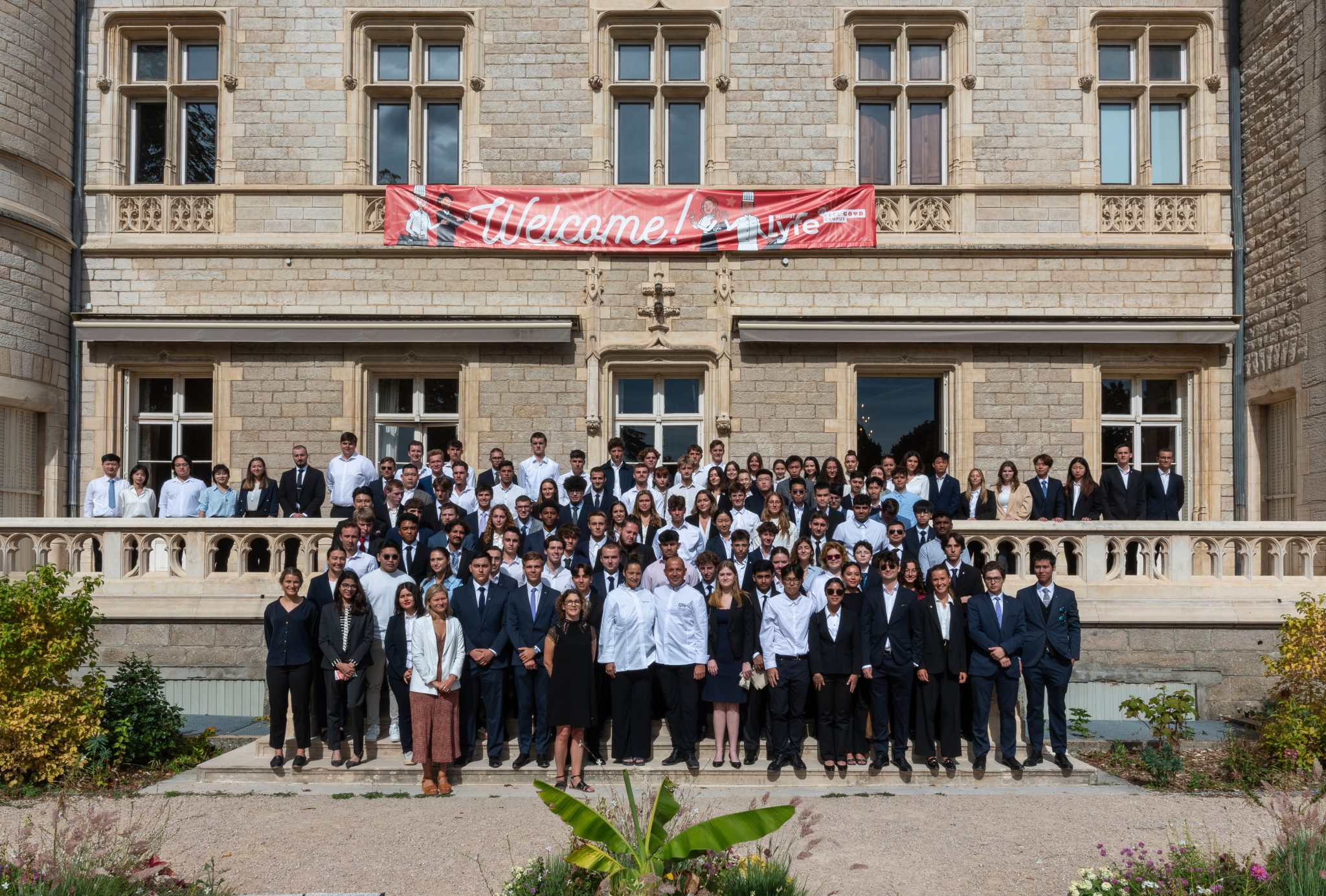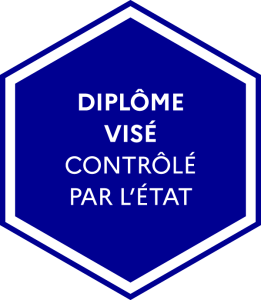What is a State-approved qualification and what are the advantages?
Published on 4 February 2025
Faire défiler la pageAs a student, choosing your higher education studies and your future school can be a real challenge. It’s often difficult to make sense of all the different types of training: school certificates, RNCP certification, State-approved qualifications, etc. But how can you tell the difference between all these qualifications? Which diplomas are recognised internationally? What’s the difference between State-approved qualifications and RNCP-certified ones?
To help you make the right choice, this article highlights the advantages of a recognised school and a State-approved qualification, guarantees of teaching quality, career opportunities and official recognition of skills at the national and international level.
Overview:
- Types of qualifications
- What is a school certificate?
- What is an RNCP-certified qualification?
- What is a State-approved qualification?
- What are the advantages of a State-approved qualification?
- The first private higher education institution in hospitality and restaurant industry
Understanding and navigating the various different types of qualifications
In a market saturated with training courses (15,000 higher education courses proposed by more than 3,500 institutions in France), understanding the real value of the qualifications on offer can be a real conundrum. However, this choice is crucial to building a solid professional future for yourself.
There are three main types of qualifications:
- school certificates: a simple document produced by your school,
- RNCP qualifications, recognised by the French Ministry of Labour, geared towards the world of work, but with a limited academic scope
- And State-approved qualifications: allowing rapid access to the employment market and representing the ultimate guarantee of academic excellence. Recognised by the Ministry of Higher Education and Research, these guarantee access to higher education studies, both in France and internationally, and also provide access to CROUS scholarships
What is a school certificate?
A school certificate is a document created by the school of higher education attesting to your attendance of a course, but without real academic or professional value. It is by no means a recognised qualification and, unfortunately, this type of document is not valid for the ECTS (European Credit Transfer and Accumulation System) or to continue your higher studies in France or abroad.
What is an RNCP-certified qualification?
A certified qualification listed in the French National Directory of Professional Certifications (RNCP) – managed by France compétences – and is recognised by the Ministry of Labour. This relates to vocational training which proves that you have acquired the necessary skills to exercise a specific profession and is designed to encourage rapid integration into the world of work. RNCP certification of a training course is obtained for a limited time, allowing for regular audits of the quality of the certifications issued.
RNCP-certified qualifications are accessible in compulsory or further education. Qualifications range from level 3 (CAP /BEP) to level 7 (Master’s).
Which training courses provide an RNCP-certified qualification?
To find out if a school delivers active RNCP certifications, or to see a list of professional qualifications, you can consult the National Directory of Professional Certifications. You will find information here on the level of study corresponding to the RNCP title, the skills acquired and the access routes.

What is a State-approved qualification?
A targeted diploma or visa is an academic qualification issued by the Ministry of Higher Education and Research (MESR). This is a guarantee of the quality of the qualifications awarded by business and management schools in the private sector.
![]() These schools of excellence are evaluated by the CEFDG (Commission for the Evaluation of Management Training and Qualifications) during a demanding audit process covering numerous criteria: academic and faculty quality; research activities; quality and rapidity of graduate hiring; openness to the international market; level of selection for entry; partnerships and professional network for quality placements; human, material and financial resources, etc.
These schools of excellence are evaluated by the CEFDG (Commission for the Evaluation of Management Training and Qualifications) during a demanding audit process covering numerous criteria: academic and faculty quality; research activities; quality and rapidity of graduate hiring; openness to the international market; level of selection for entry; partnerships and professional network for quality placements; human, material and financial resources, etc.
Obtaining a State-approved qualification is a guarantee of quality and confidence in building a successful academic and professional future.
How to find training courses providing a State-approved qualification?
 State-approved qualifications are indicated by a specific badge or logo like the one featured here. If you see this on the website of a higher education institution, then the qualification is recognised by the State. If you have any doubts, you can search by the name of the institution or by specialisation on the CEFDG website. State-approved higher education (post A-level) courses are listed on the Parcoursup platform.
State-approved qualifications are indicated by a specific badge or logo like the one featured here. If you see this on the website of a higher education institution, then the qualification is recognised by the State. If you have any doubts, you can search by the name of the institution or by specialisation on the CEFDG website. State-approved higher education (post A-level) courses are listed on the Parcoursup platform.
What are the advantages of a State-approved qualification?
The main advantages of a State-approved qualification are:
- Quality of teaching: the educational programmes are validated by the state and the courses are taught by qualified staff.
- Further studies: it provides access to Master’s degrees, in France or internationally, via the ECTS system
- International mobility: it is recognised abroad and facilitates acceptance of equivalent qualifications to work or study anywhere in the world
- Access to a network of academic partners in France and abroad, such as our Alliance Network, which brings together the world’s leading schools in Hospitality and Culinary Arts Management
- Scholarships : students can benefit from CROUS scholarships to finance their studies.
- Employability: it is synonymous with the quality and relevance of your training and ensures optimal credibility with recruiters
Hoe to define a State-approved qualification
Institut Lyfe: an international school of excellence
It is very difficult to enter the select circle of State-approved qualifications, which are a guarantee of quality and excellence. Institut Lyfe is proud to offer this level of excellence for its Bachelor’s degrees in management of hospitality and culinary arts.
 In France, only 65 higher education schools are recognised by the CEFDG and only 36 training courses for 3- or 4-year degrees are State-approved. Institut Lyfe is proud to be counted in this number.
In France, only 65 higher education schools are recognised by the CEFDG and only 36 training courses for 3- or 4-year degrees are State-approved. Institut Lyfe is proud to be counted in this number.
Institut Lyfe – a management school specialising in the culinary arts, patisserie and hospitality-restaurant sectors – was the first private higher education institution in hospitality and food service to have obtained recognition from the Ministry of Higher Education and Research.
The 3- and 4-year Bachelor’s degrees awarded by Institut Lyfe are recognised and approved by the State.
This accreditation strengthens the international legitimacy of our school with the government authorities of partner countries.
If you would like to know more about the certifications and awards held by Institut Lyfe, please consult our dedicated page.
Your qualification attests to your training and will serve you throughout your career. Your choice of higher education course and the qualification awarded by your future school can influence your future. So it is crucial to choose your course carefully, especially if you want to continue your studies with a specialist Master’s degree or go on an international exchange.















